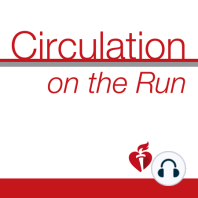16 min listen
Circulation May 18, 2021 Issue
ratings:
Length:
27 minutes
Released:
May 17, 2021
Format:
Podcast episode
Description
This week, please join author Uwe Tietge and Associate Editor Anand Rohatgi as they discuss the article "High-Density Lipoprotein Anti-Inflammatory Capacity and Incident Cardiovascular Events" (https://www.ahajournals.org/doi/10.1161/CIRCULATIONAHA.120.050808) Dr. Carolyn Lam: Welcome to Circulation on the Run, your weekly podcast summary and backstage pass to The Journal and its editors. We're your co-hosts, I'm Dr. Carolyn Lam, associate editor from the National Heart Center and Duke-National University of Singapore. Dr. Greg Hundley: And I'm Dr. Greg Hundley, associate editor, director of the Pauley Heart Center at VCU Health in Richmond, Virginia. Well, Carolyn, we've got a very interesting feature this week. It involves another paper in the line of the story of HDL, and looking at HDL and future cardiovascular events. But before we get to that, how about we grab a cup of coffee and jump in and review the other articles and the issue? And Carolyn, this week, maybe I'll go first. Dr. Carolyn Lam: Go, I've got my coffee. Dr. Greg Hundley: Very good. So Carolyn, this paper comes to us from Dr. Huso Hakala, from the University of Turku at Turku University Hospital, and the study pertains to cognition and cardiovascular disease. So Carolyn, as you know, cardiovascular risk factors such as high blood pressure, adverse serum lipids, and elevated body mass index, and midlife may harm cognitive performance. So importantly, perhaps the presence of cardiovascular risk factors since childhood, Carolyn, may impact cognition later in life. So these authors studied the associations of the cardiovascular risk factors from childhood to midlife, their accumulation and midlife cognitive performance. They gathered their data beginning in 1980 from a population-based cohort of 3,596 children who are aged three to 18 years that were repeatedly followed up for 31 years, and they assess blood pressure, serum lipids, body mass index, all in the follow-ups. Dr. Carolyn Lam: Wow. So accumulating risk, I suppose, Greg. So what did they find? Dr. Greg Hundley: Great. Carolyn, glad you asked. So consistently high systolic blood pressure or serum total cholesterol associated with worse midlife episodic memory and associated learning, compared to situations when blood pressure or cholesterol values were low. Obesity since childhood associated with worse visual processing and sustained attention compared to individuals or children that had normal weight. And an inverse trend association was observed for the cardiovascular risk factor accumulation with episodic memory and associated learning with visual processing and sustained attention and with reaction and movement time. So the take home Carolyn, is that, maybe we should be launching preventative strategies against some of these cardiovascular risk factors beginning in childhood, because perhaps they could benefit primordial promotion of cognitive health for those later in adulthood, maybe like you and me. Dr. Carolyn Lam: Oh, wow. Thinking back on my blood pressure, cholesterol and weight, I suppose, since childhood, yikes. Well, the next paper Greg is an important analysis from DAPA-HF. Now as a reminder in the DAPA-HF trial, the sodium glucose co-transporter two inhibitor dapagliflozin was shown to reduce the risk of cardiovascular death and a first episode of worsening heart failure, in patients with heart failure with reduced ejection fraction or HFpEF. In the current paper from Drs. Jhund and colleagues from University of Glasgow, they described the efficacy of dapagliflozin on the predefined secondary end point of total heart failure hospitalizations. That's the first and recurrent heart failure hospitalization and cardiovascular death. And this is so important because we know that patients with HFrEF are known to experience multiple episodes of heart failure during the course of the disease. Dr. Greg Hundley: So Carolyn, what did they find? Dr. Carolyn Lam: Well, they did this analysis by two me
Released:
May 17, 2021
Format:
Podcast episode
Titles in the series (100)
Circulation August 30, 2016 Issue: Circulation Weekly: Your Weekly Summary & Backstage Pass To The Journal by Circulation on the Run
